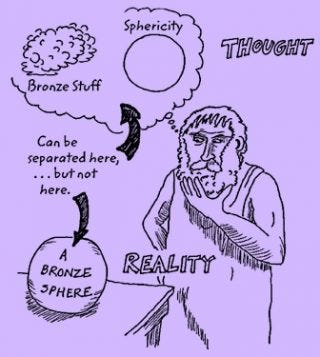Plato vs Aristotle : Substance
Plato : Ideas are Substances. Period
Aristotle refutes this.
Metaphysically, substance is that which does not change.
Logically, substance is that which is the subject and not the predicate. For example, in “You are beautiful”, You is the subject and beautiful is the predicate, beauty in this regard cannot exist without the subject.
He refutes Plato’s idea of substances being universal. As humanness cannot exist apart from human beings, and beauty cannot exist apart from beautiful things, substances are NOT universals.
As the subject CANNOT exist without the predicate and vice versa, we cannot say the ideas of Plato have independent existence. Ideas are dependent on the particular thing in question.
According to Aristotle, then, substance is the concrete individual thing, that which has both matter and form.

Reality, then, is a plurality of Individual substances. It is determinate.
Aristotle says, that substance has three elements:
1. Universal to individual things
2. Quality, Quantity, Relation, Space, Time, Position etc
3. An unknown substratum called matter itself.
However, the ultimate substance is God, which is matterless form.
The conclusions made by both philosophers is because of the nature of their observations …
What Plato does, is something known as Revisionary Metaphysics — creating a better and ideal structure of reality than that which can be actually conceptualised. He does this because he is convinced that the world is constantly changing, and it is impossible to get absolute knowledge from the empirical world. He is greatly influenced by abstract concepts of mathematics and therefore proposes abstract concepts of ideas.
What Aristotle does, is something known as Descriptive Metaphysics — describing and elucidating the actual conceptual scheme of the world. He is convinced that this world is the only world that matters. Sense experience plays an important role in attaining knowledge for him, which has been greatly influenced by concrete concepts of biological sciences.
How Aristotle tries to destroy the philosophy of Plato…
- Ideas i.e substances cannot be independent of particulars. See the world, substances cannot exist without the object.
- If you isolate ideas alone, how can the idea of ‘blue’ explain particular blue things? You cannot show that blue flowers, or blue feathers come from the idea of blue.
- If you say that ideas are non sensible, and particular things that come from non-sensible ideas are sensible, then it means ideas are sensible. This requires another pattern which portrays the likeness of both — This is the classic Third Man Fallacy
- The copies of ideas keep going on and on. For example, man is the idea of men, the idea of men comes under the idea of animals, the idea of animals come under the idea of living beings etc etc.
However, Aristotle’s philosophy is not without loopholes
- The notion that a Pure Form i.e God or Prime Mover exists, goes against the foundations of his philosophy — making him revert back to the Platonic ways.
- Causes as described by Aristotle is irrelevant in the real world. Causes now means the nature of causal relationship.
- Notion of potentiality and actuality is arbritrary. Even unjustified things can get some justification. For example, a hierarchical view of society, in which some individuals are considered to be inherently superior to others based on their actualized capacities.
Next :
The beginning of Rationalism
